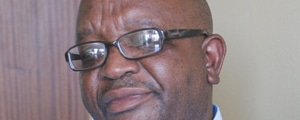
The year was 1965. The two seven-year-old twins came first and second in their Grade One (then Sub A) year-end examinations.
Painona with Tapiwa Nyandoro
They repeated the feat in 1966 in Sub B (now Grade Two) examinations. They never made it into Grade Three (then Standard One). They were withdrawn from school by their parents.
Rumours swirled that due to the Apostolic Faith and the minimal education of their parents, it had been decided by the family that educating the girl child was not a profitable venture; that notwithstanding the little angels’ academic talent. Some said a “prophet” had identified them as his future wives. What horrors awaited them, I never got to know. But the entire Standard One class of 1967 they were supposed to lead was traumatised. To this day the mental scars remain.
NewsDay of December 4 2013 reported that persistent water shortage in Harare’s high population density suburbs was affecting women and girls negatively. Some girls, the report said, had dropped out of school to hunt for water. Such things should never happen.
The irony is that Zanu PF’s free education policy that may have reduced this sort of tragedy for some time helped to bring the economy to its knees in the absence of a viable industrial policy to ensure the needed economic growth beyond 7% per annum to provide the jobs, wages and taxes needed to finance essential social services, the provision of safe water being one, apart, of course, from other public goods such as “free” education and healthcare services.
Good quality education is the best mass empowerment tool. Francis Nhema, the Minister of Youth, Indigenisation and Economic Empowerment, to his credit, trumpets the point.
“There are a few policy questions to which improving the quality of education is not a reasonable answer,” agreed The Economist of October 12, 2013. The latest Grade 7 results, with a 30% pass rate, are thus cause for serious concern.
- Chamisa under fire over US$120K donation
- Mavhunga puts DeMbare into Chibuku quarterfinals
- Pension funds bet on Cabora Bassa oilfields
- Councils defy govt fire tender directive
Keep Reading
An analysis of Grade 7 results pre-independence usually showed significant differences in the pass rate between the rural poor and the urban working class. Of late, Matabeleland provinces have lagged behind.
What could be the reasons? Teacher quality, child labour, poor nutrition, shortage of books, disgruntlement among poorly-paid teachers and/or the decaying school infrastructure? Usually, it is a combination of some or all of the lot, and the solution is adequate funding and appropriate teacher selection, training, management and assessment or evaluation.
With no fiscal space for adequate funding of education, the government may have no choice but to consider off-balance sheet funding.
As the following recent advertisement shows, this it may be doing: “The Ministry of Primary and Secondary Education is happy to confirm the date of 4th December 2013 for the National School Infrastructure Expo and Conference to be held at the Harare International Conference Centre under the theme Quality Education in a Growing Economy.”
The expo wished to showcase architectural designs and models of durable, eco-friendly, affordable school structures suitable for different socio-economic environments. Apart from professionals in the build environment, those in banking and financial services were invited to the expo and conference. The ministry may be on to a good thing.
Off-balance sheet financing, similar to the model being used to finance the rehabilitation of the Plumtree to Mutare Highway, may be the way to go.
But the crisis in the education sector requires a speedier approach. The drawings requested could have also targeted specific schools were land for expansion is available such as faith (mission) and government boarding schools where demand for Form One places and for primary school education in a boarding setting is extremely high, due to the known quality of the education they provide.
Infrastructure expansion, to double or treble capacity, and refurbishment in these schools is long overdue. Their expansion is viable business proposition.
The government could float an Education Infrastructure Bond for the infrastructure upgrade and expansion for such targeted “charter” schools.
As demand for places at such schools is high, enhanced revenue from school fees and development levies could then be used to pay off the debt.
The challenge is to allow access to these schools by academically gifted children from poor families. Besides, excellent academic talent, regardless of socio-economic background, such as possessed by the two little angels referred to above, enhances the viability of the business proposition, as it reduces risk and grows the school brand. Academically gifted but poor souls, whose parents otherwise would not afford good quality boarding education, should be able to access loans from a government-guaranteed Human Capital Development Bond.
In return, the government would seek the securitisation of a portion of the future earnings of the gifted talent after beneficiary students’ tertiary education. “The key,” according to The Economist of September 16, 2000, “is to unlock those future earnings so that the (talented) children can be free to study (and maybe even play) in the present”.
Such a scheme, where parents make these “negative bequests” on behalf of their children, but with children being the beneficiaries of the proceeds, could have saved the two little girls whose possibly negative bequests may have benefited their parents.
It is time to stop the rot. It also gives the government the opportunity to pour more resources into compulsory primary school education as it pulls out of funding secondary and tertiary education.











